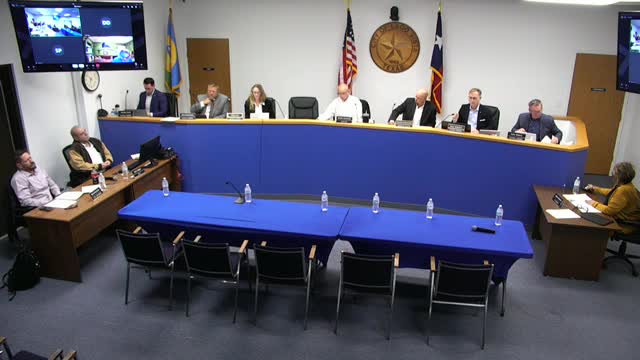Lago Vista council and CPAC press for parkland preservation, question consultant findings
Get AI-powered insights, summaries, and transcripts
Subscribe
Summary
City council and the Comprehensive Plan Advisory Committee reviewed the draft parks chapter of the city's comprehensive plan, with members urging stronger language on parkland acquisition and criticizing portions they said repeat well-known priorities rather than propose new strategies.
Lago Vista 'City Council and the Comprehensive Plan Advisory Committee met in a joint work session on Jan. 16, 2025, to review the draft parks chapter of the city's comprehensive plan.
Members of the advisory committee and several council members said the chapter compiles prior input but falls short of new direction, and urged the city to use the document to prioritize acquiring and protecting parkland and trails.
The discussion matters because the draft chapter will guide grant applications, park investments and development-review decisions; several council members said a clearer priority on land acquisition would strengthen applications for state and federal funding.
CPAC members and councilors said the draft reiterates long-standing public preferences for trails, natural open space and retaining the area's green character but does not put enough emphasis on reserving land. "We saw the top 2 or 3 survey results''it's all around retain green space and natural beauty. More parks, more trails," said a CPAC member. Another CPAC member said, "We are strapped for money. We know that infrastructure is going to take over for the next 5 years." Those speakers asked the council and staff to focus on tactical, lower-cost improvements to Sunset Park and to preserve land when new development is reviewed.
Councilmembers and CPAC members also raised technical corrections and mapping errors. Councilmember Norma (first name used in the meeting) asked that maps and acreage figures be corrected where the consultant had used parcels outside the city limits or overstated park acreage. Staff acknowledged specific mapping errors and said corrections would be made before a final draft returns to council.
Several speakers urged using the parks chapter as a tool to support grant applications. "When you go after grants, one of the things they immediately look for is the priority that the community puts on these endeavors. This is one way to show that," a councilmember and grant liaison said. Turnback Trail Conservancy grants and a transfer from Texas Parks and Wildlife were discussed as active opportunities; staff reported the city was waiting on TPWD to complete a transfer so grant-funded trail work can proceed.
Participants repeatedly urged that the plan do more than reflect where development can occur; they asked for clearer language or ordinance tools to require parkland dedication in new PDD or development agreements. One CPAC member suggested updating the parkland dedication ordinance so that some new development would be required to set aside land for public use rather than relying solely on fee-in-lieu payments.
Council direction: staff was asked to (1) correct maps and acreage errors identified in the meeting, (2) add clearer, "meaty" language that prioritizes acquiring and preserving open space and trail corridors, and (3) provide the council with a revised draft for further review. Councilmembers also asked the Parks and Recreation Advisory Committee to develop a prioritized list of low- and high-cost projects that can be executed as funding becomes available.
A number of CPAC members and councilors said the report will still be useful as a grant-supporting tool even if it does not contain new, innovative ideas. "At a minimum, it is a valuable tool," a councilmember said, recommending committees use the document to sequence work as funds appear.
The council recessed the work session at 7:35 p.m. and moved to the next agenda item; staff said the full draft will be revised and returned to council for review.
Ending: Staff and CPAC were asked to submit corrections and a prioritized list of projects; the council signaled it will use the revised parks chapter principally as a grant and policy tool and to guide future committee work.
